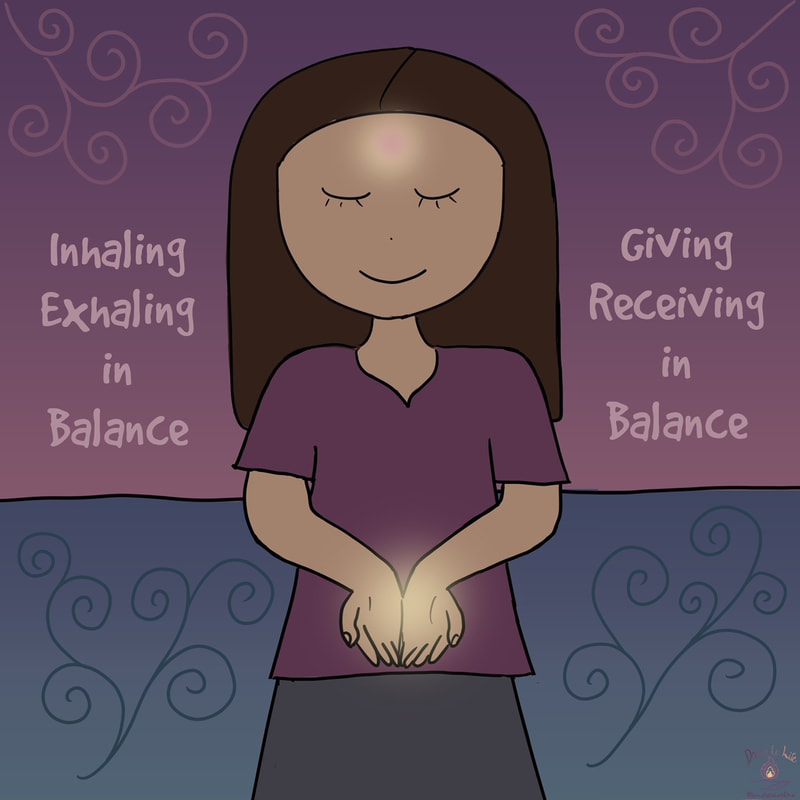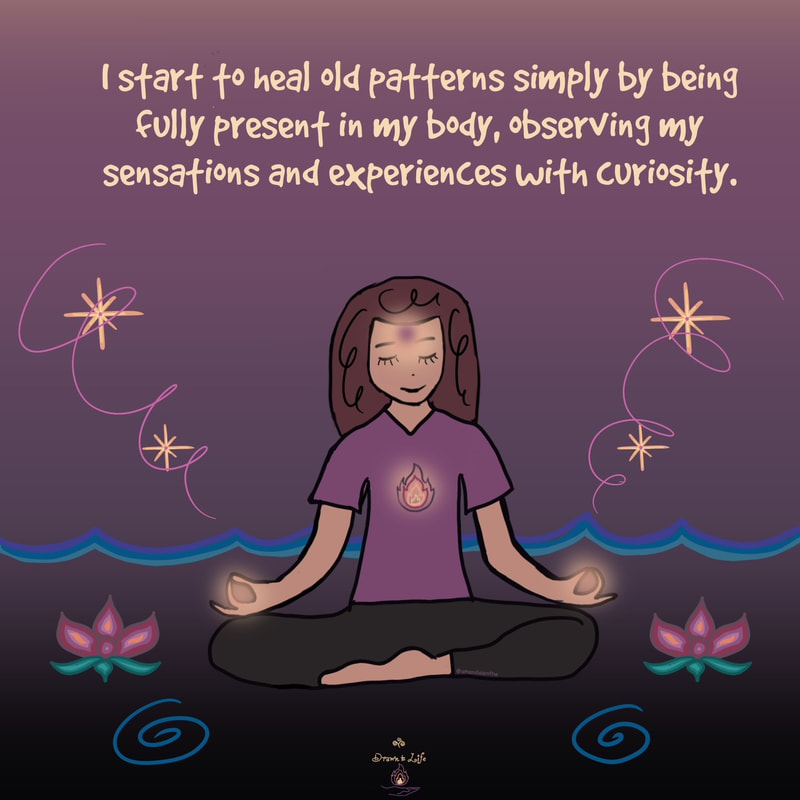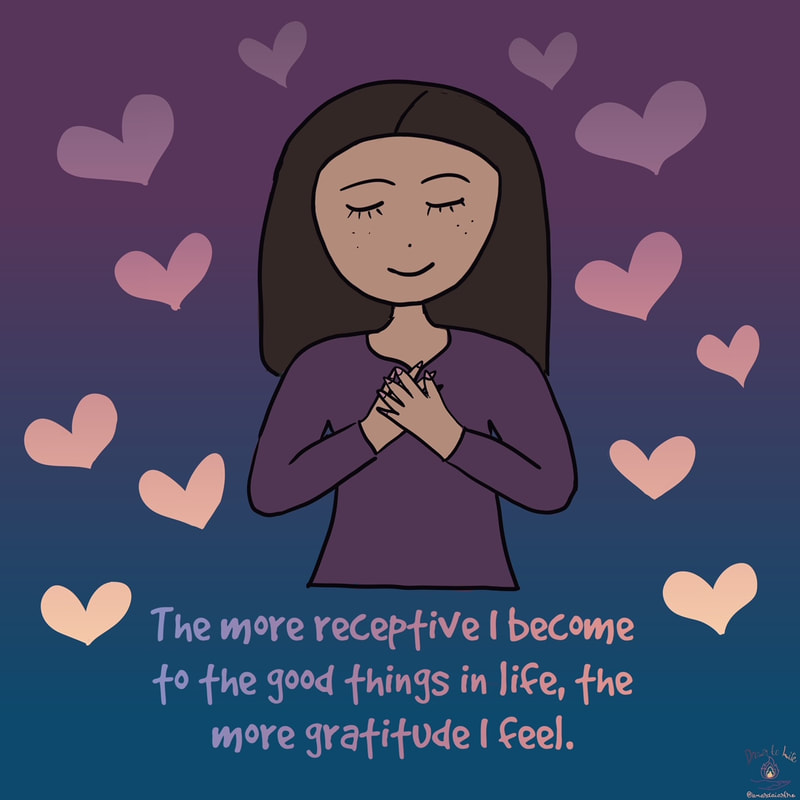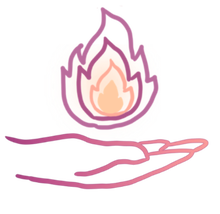|
I recently concluded that there’s no such thing as someone who takes or receives more than they give, or gives more than they take. Perhaps, in an individual relationship at particular a moment in time, it may be lopsided, but I am certain the net in our life is balanced. Which means the goal is not to become a more generous person, but to expand the capacity for both giving and receiving. The more we expand our capacity to receive, the more we are able to give. The more we grow our capacity to give, the more we are able to receive. Deeper inhale, deeper exhale. When I really think about it, it’s hard to see where receiving ends and giving begins. How often do we feel filled up when we are able to give someone what they need? How beautiful is it that in the process of giving, we receive? And when we are the recipient of someone else’s gift, and we can really receive it and express our gratitude, we give back to them an assurance that what they gave us mattered. In fully receiving, we give. This makes me wonder, when we label a person as an over-giver or overly selfish, are we really just noticing a constriction in their overall giving and receiving cycle? When someone appears selfish, they are probably having trouble with both giving, i.e. feeling they have something of value to share, and receiving, i.e. feeling worthy. I know it may seem some people are taking so much and not giving back. But I would argue they haven’t truly been able to receive what others have given them, at least not on the emotional level where it counts. (This begs the question, like the tree falling with no one around, if a person can’t receive what someone offers, does the giving even occur?) Similarly, when one identifies with over-giving to the point of depletion or resentment, maybe it's more about giving too much to people who are unable to receive. Perhaps the off-balance feeling isn't always (or only) because the person can't give back, but rather because he or she can't receive and therefore can’t complete the cycle by providing the giver the fulfillment that comes from knowing their contribution made a difference. Healthy giving feels like a receiving because of the sense of joy and purpose we get when we see someone truly benefiting from what we have to offer. Which leads me back to my initial instinct that not only are we always in balance with giving and receiving in our life overall, but in each of our relationships, if we look deeply into the exchanges at an emotional level. Of course I cannot prove this "Theory of Balance in Giving and Receiving." There’s no objective way to add up a person’s giving and receiving in each interaction over their lifetime. But I offer this as something to consider when weighing the dynamics of our relationships, and our perception of the balance of give and take in each. It's hard to know where receiving ends and giving begins. Because healthy giving feels like a receiving, and healthy receiving is a gift to the giver. Now you might be thinking, "that's all fine and dandy, Amanda. Maybe you even have a point. But even if this is true, the question remains then: how does one increase one’s capacity to both give and receive?" It definitely feels correlated with one’s nervous system capacity and felt experience around the safety of holding energy. Outside of miracles, it’s perhaps impossible to receive or give more than one feels worthy of. Self worth is tied to our deeply held, often unconscious, beliefs inside about who we are and how much we are allowed to enjoy and have in life, usually wired in at a very young age. So how do we access those deeply held beliefs and reprogram them? The only thing I've ever had faith in being able to do this is meditation. What else could possibly get deep enough into our psyche to rearrange or uproot deeply held beliefs? But it was quite abstract to imagine, and up until a few months ago, I wasn't able to have a consistent deep meditation practice because I (my nervous system) couldn't manage the feelings that would come up when I did. It wasn't until I started working with a trained trauma and somatic healer that I was able to start accessing parts of me that I saw others, with more stable nervous systems, able to access through meditation (or a balanced nervous system they developed in early childhood). The thing about somatic healing, is that it focuses on presence and awareness of the here and now in your own body, much like meditation, but in the presence of someone who can hold the space and emotions that come up in the process. I am still learning about the actual biochemistry of it all, but there's something that happens when we get out of our thinking minds (which are really just recycling old stories and beliefs most of the time), and into a state of non-judgmental presence towards our selves in the present, that allows our nervous system to relax and learn a new state of being, a state of being closer to who we were before the traumas of life hit us and caused us to contract or feel unworthy. I am happy to report that after two years of somatic therapy, I am finally able to do deep breathing and meditation each morning without losing my balance or falling apart, and I'm so grateful for this. Share with me your experience with meditation and nervous system regulation in the comments below. I tend to circle back to the same four or five themes in my writing, but I can muse about most anything at least once. So if you have any topics you'd like me to write about, let me know in the comments. I can't guarantee to have definitive answers, but I can guarantee a thoughtful musing
0 Comments
It seems to me, that in order to experience that wonderful feeling of gratitude we are told is the pinnacle of a successful life, we actually need to be in a receiving state. Which means when we have difficulty feeling grateful in a situation we need not judge ourselves as "bad" or "wrong", (which further pushes us away from good feeling) and instead see it as a signal that we are closed off to receiving in some way. This perspective helps to eliminate the shame that can compound on top of whatever painful feelings we are already experiencing. It guides us to be curious about what ways we are needing nurturing and healing. Instead of trying to brute force ourselves to gratitude journal when we aren't feeling it, we can bring more attention to what we are feeling and see if we can move through it. Of course, reminding ourselves to count our blessings and find silvers linings in times of stress can still be helpful. It's just there are times when focusing on gratitude can make things feel worse, not better. In fact, sometimes defaulting to gratitude journalling can be a form of spiritual bypassing, when what's needed is to go deeper into the pain first, before we can open up to the good feelings. I wrote the affirmation in this drawing partly in response to the trend in the wellness community of touting gratitude as the key to creating a life you love. So much so that there's more shame now around not feeling gratitude (and shame is a show stopper when it comes to learning.) Not to mention the spiritual bypassing that gets activated when one tries to force oneself to feel grateful when maybe the next step is to get sad, and go inward to heal.
As always, this relates to that point I come back to time and again: for those of us in the metaphysics and philosophy space, we need to keep in mind that we are just guessing about what causes what. Yes, we all notice that people who feel happier or experience great abundance tend to feel gratitude more often. But immediately concluding that it's the gratitude causing the happiness/abundance is a bit premature. Why couldn't it be the happiness causing the gratitude? Or, more likely, something else entirely causing both? We have to be aware of what they call in statistics the "correlation vs. causation" concept, which says that just because two things are correlated doesn't mean that one is causing the other. A third thing could be causing both. So, just for fun, I wanted to look at gratitude, not as something to pressure ourselves to feel in order to have a good life. But as an indicator of whether we are in a receiving state. If we can't access the feeling, maybe there is something else we need to do before we can get into that state of receptivity and gratitude. P.S. Receiving takes practice, and requires us, not to shrink ourselves, but to expand our feelings of self worth and what is possible for us in life. Often this involves learning to move through uncomfortable feelings and becoming more present to our needs on a moment to moment basis. And this may require the assistance of a trained somatic healer. But don't discount simple solutions, such as calling a loved one, doing art, or going for a run or a walk in nature. |
Author:Amanda I. Greene This is where I share thoughtful, and sometimes unpolished, musings in the form of philosophical explorations, inspirations, poems, and artwork.
Archives
March 2025
Categories
All
|





 RSS Feed
RSS Feed